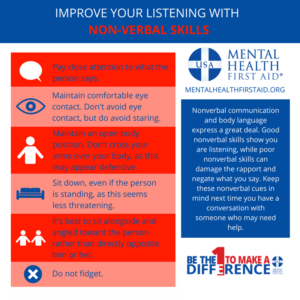By Stephanie Natoli on June 18, 2018
A lot can be said without words in a face-to-face conversation. Often, our non-verbal communication—our facial expressions, body posture, eye contact, etc.—speaks loudest. These non-verbal cues play a huge role in how our words and intentions are interpreted. Good non-verbal skills can help show your support by expressing you genuinely care and are truly hearing what someone has to say.
To show support for someone we’re talking to, it’s important to not only be aware of their nonverbal cues, but also our own. During your next face-to-face conversation about mental health, keep these tips in mind:
- Pay close attention to what the person says. Really listening to what the person is telling you is crucial to being a helpful listener. When you reply, it can be helpful to repeat some of what they told you, using the same language. This attention to detail demonstrates that you care.
- Maintain comfortable eye contact. Don’t avoid eye contact, but do avoid staring. It’s important to meet someone’s gaze. It shows you are interested and that your focus is on them – quite literally!
- Maintain an open body position. Avoid crossing your arms over your body – it may appear defensive. When your body position is open, it conveys that you are open to listening.
- Sit down, even if the person is standing. Being on the same level as someone appears less threatening and can make them feel more comfortable, while avoiding feelings of tension or nervousness when having personal conversations.
- Sit alongside and angled toward the person rather than directly opposite them. This allows the conversation to feel friendly and nonconfrontational. No one wants to feel like they’re being interviewed.
- Avoid fidgeting. During a sensitive conversation, it may be tempting to fidget, but it can be distracting to the person who is talking. It could also make it appear that you are uncomfortable, nervous or bored.
When used together, these non-verbal behaviors can improve your communication skills. Sometimes it’s not about what you say, but what you do. By being an effective listener, you are showing your support, which in turn will help a friend, family member or someone in your community who may be living with a mental health or substance use challenge.
To continue learning how to start and maintain conversations around mental health and addictions, find a Mental Health First Aid course near you today.
